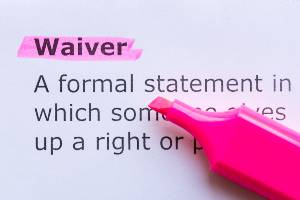Blog
Can You Recover Compensation for an Injury After Signing a Liability Waiver?
Posted on behalf of Peter T. Nicholl in Personal Injury Published on September 8, 2022 and updated on October 3, 2022. Many of us have signed a liability waiver at one time or another. For example, membership contracts for gyms/fitness centers often include liability waivers. Tickets to concerts and sporting events may have liability waivers written on the back. If you go skydiving, bungee jumping or zip lining you will probably be asked to sign a liability waiver.
Many of us have signed a liability waiver at one time or another. For example, membership contracts for gyms/fitness centers often include liability waivers. Tickets to concerts and sporting events may have liability waivers written on the back. If you go skydiving, bungee jumping or zip lining you will probably be asked to sign a liability waiver.
Businesses ask customers to sign these documents to try to shield themselves from liability in case a customer gets injured while engaging in an activity. While the language of each waiver may be slightly different, each one says you waive your right to take legal action if you suffer an injury. In other words, you are accepting the risks of engaging in an activity.
You may think these documents always prohibit people from taking legal action but that may not be true. There are exceptions when liability waivers cannot be enforced. That is why you should discuss the situation with a licensed attorney.
Peter T. Nicholl Law Offices has been helping injured victims for decades and our Maryland personal injury lawyers have secured millions in compensation for crash victims.
What Does Maryland Law Say About Liability Waivers?
Maryland courts typically enforce liability waivers, although there are exceptions when victims may still be able to take legal action after signing one of these documents. For example, if the company issuing the waiver is a commercial business, the waiver is often enforced.
However, Maryland courts have held that these waivers might not be enforceable if the waiver has ambiguous language. The document must explicitly say the person signing it is releasing the other party from liability for negligence. Some of these waivers also need to state you agree to not hold the company liable for any claims arising from your use of the facilities.
If you were the victim of willful, wanton or reckless negligence, it would be a challenge to enforce a liability waiver.
If the organization that issued the waiver is a government agency or non-profit corporation (Boy Scouts, Boys and Girls Clubs, etc.), the law is less clear about the enforceability of the waiver. If you are in this type of situation, you should call an experienced attorney to discuss possible legal options.
What if I Signed a Liability Waiver on Behalf of My Child?
If you sign a liability waiver on behalf of your child, it can be enforced, unless an exception applies. For example, if your child was injured because of egregious negligence while on a field trip, the liability waiver may not be enforced. In this type of situation, the waiver may also be invalid because it was issued by a government agency or non-profit corporation.
Should You Sign a Liability Waiver?
This is a difficult question to answer, as there are many factors to consider. It is important to understand the risks of the activity before signing the document.
If you suffer an injury, you should not assume you do not have legal options. That may not be true, and an experienced attorney can review the situation to give you a better idea about what steps to take next.
Contact Peter T. Nicholl Law Offices to Schedule a Free Consultation
A liability waiver might not hold up in court, depending on the wording of the waiver and other factors, such as the cause of your injuries.
That is why it is important to discuss legal options with a licensed attorney. You may still be able to seek compensation, and our services come at no upfront cost.
You could have long-term injuries that need expensive treatment. Without compensation, you could be left trying to pay these expenses out of your own pocket.
Call Peter T. Nicholl Law Offices: 410-401-9979.

